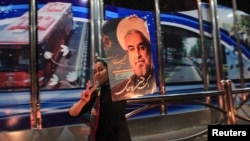Iran's President-elect Hassan Rowhani has hailed his win in the country's election as a victory over "extremism," as thousands of his supporters celebrated Sunday in the streets of Tehran.
In his first public statement since Friday's vote, the reformist cleric called his election a victory of moderation and intelligence over extremism.
Many analysts see Rowhani's surprise victory as a popular repudiation of the conservative hardliners in the race.
The president-elect has vowed to improve ties with the international community, although Iran's supreme leader, Ayatollah Ali Khamenei, has the final say in all strategic matters, including nuclear policy.
Rowhani, a former chief nuclear negotiator and the favorite of reformists, earned slightly more than 50 percent of the vote - close to 19 million out of nearly 37 million counted. His closest competitor among five other candidates was Tehran Mayor Mohammad Bagher Qalibaf, who received about 16 percent of the vote. Turnout was more than 70 percent.
U.N. Secretary-General Ban Ki-moon congratulated Rowhani and encouraged Iranian authorities and the president-elect to play a "constructive role" in regional and international affairs.
The Obama administration also congratulated the Iranian people for their participation in the election. But White House Press Secretary Jay Carney said Iran's election took place amid what he called "government obstacles and limitations," including censorship of the media, an intimidating security environment and a lack of transparency.
Carney said the U.S. hopes Iran's government will heed its people's will and make choices that create a better future for them. He reiterated the U.S. willingness to engage Iran directly to reach a diplomatic solution to concerns about its nuclear program.
Rowhani will take on an economy struggling with high unemployment and inflation, and crippled by international sanctions for the country's disputed nuclear program.
Israeli Prime Minister Benjamin Netanyahu on Sunday cautioned the international community not to ease sanctions on Iran because of "wishful thinking" following Rowhani's election. He called Iran's alleged pursuit of atomic weapons the "greatest threat to world peace," and pointed out that Iran's supreme leader, not the president, is the person who determines nuclear policy.
Iran's presidential vote was the first since President Mahmoud Ahmadinejad's disputed re-election in 2009 spawned widespread protests and a bloody crackdown by the government. Ahmadinejad, known internationally for his hostility toward the U.S. and Israel, was barred by law from a third term.
Some information for this report was provided by AP and Reuters.
In his first public statement since Friday's vote, the reformist cleric called his election a victory of moderation and intelligence over extremism.
Many analysts see Rowhani's surprise victory as a popular repudiation of the conservative hardliners in the race.
The president-elect has vowed to improve ties with the international community, although Iran's supreme leader, Ayatollah Ali Khamenei, has the final say in all strategic matters, including nuclear policy.
Rowhani, a former chief nuclear negotiator and the favorite of reformists, earned slightly more than 50 percent of the vote - close to 19 million out of nearly 37 million counted. His closest competitor among five other candidates was Tehran Mayor Mohammad Bagher Qalibaf, who received about 16 percent of the vote. Turnout was more than 70 percent.
U.N. Secretary-General Ban Ki-moon congratulated Rowhani and encouraged Iranian authorities and the president-elect to play a "constructive role" in regional and international affairs.
The Obama administration also congratulated the Iranian people for their participation in the election. But White House Press Secretary Jay Carney said Iran's election took place amid what he called "government obstacles and limitations," including censorship of the media, an intimidating security environment and a lack of transparency.
Carney said the U.S. hopes Iran's government will heed its people's will and make choices that create a better future for them. He reiterated the U.S. willingness to engage Iran directly to reach a diplomatic solution to concerns about its nuclear program.
Rowhani will take on an economy struggling with high unemployment and inflation, and crippled by international sanctions for the country's disputed nuclear program.
Israeli Prime Minister Benjamin Netanyahu on Sunday cautioned the international community not to ease sanctions on Iran because of "wishful thinking" following Rowhani's election. He called Iran's alleged pursuit of atomic weapons the "greatest threat to world peace," and pointed out that Iran's supreme leader, not the president, is the person who determines nuclear policy.
Iran's presidential vote was the first since President Mahmoud Ahmadinejad's disputed re-election in 2009 spawned widespread protests and a bloody crackdown by the government. Ahmadinejad, known internationally for his hostility toward the U.S. and Israel, was barred by law from a third term.
Some information for this report was provided by AP and Reuters.

